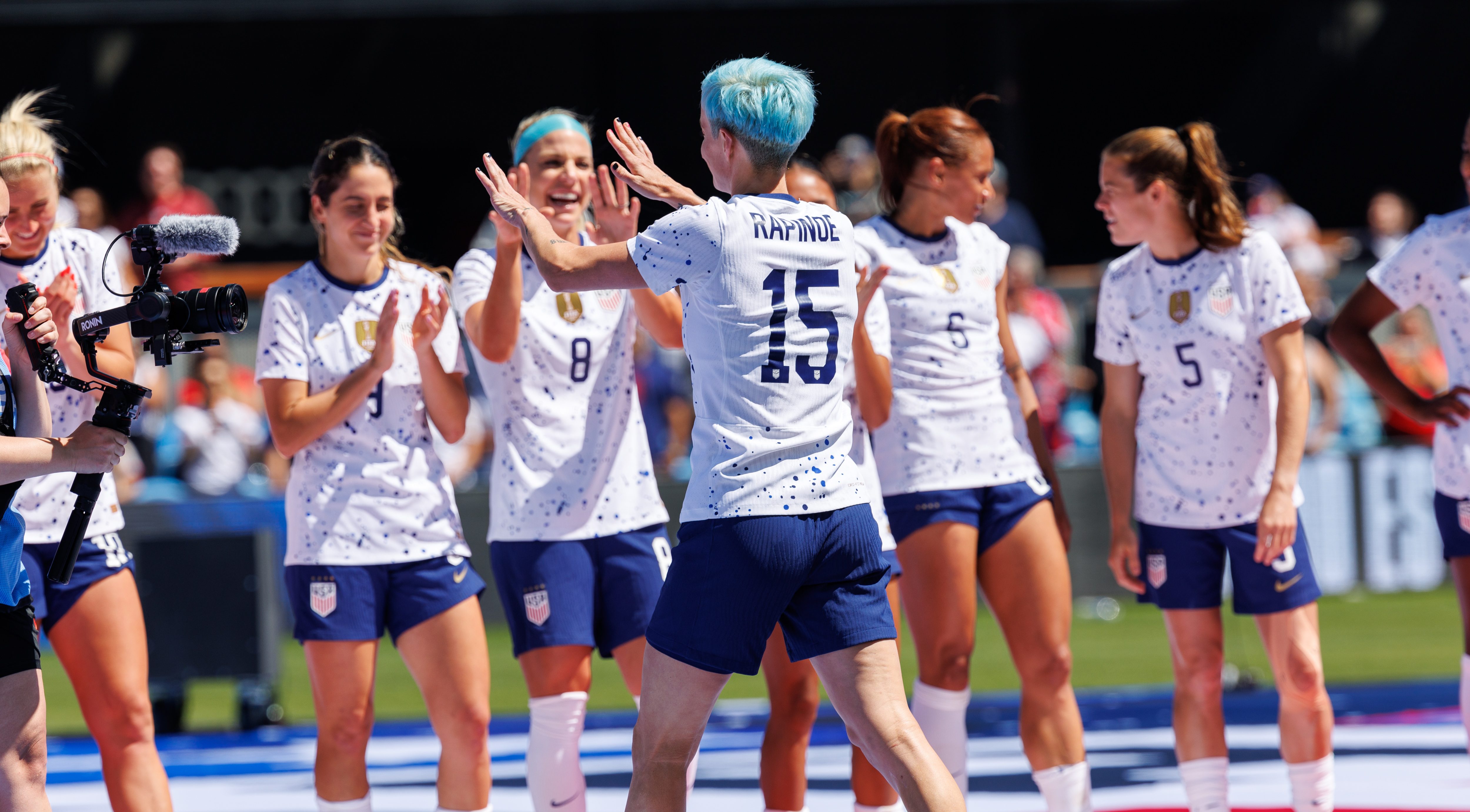Editor's note: This article contains references to suicide and suicidal ideation. If you are experiencing a mental health crisis, call the national suicide and crisis lifeline in the United States at 988.
"Take the time to say hi to someone. Send a text if you feel like you haven't checked in on someone in a while."
That's the advice 22-year-old USWNT star Sophia Smith has for reducing stress and connecting with others. As she said on NBC’s “My New Favorite Futbolista” podcast, the best thing you can do is just be kind to people.
Smith is the youngest-ever National Women's Soccer League MVP and the 2022 U.S. Female Player of the Year. Off the field, Smith suffered the devastating loss of her best friend and former Stanford teammate, Katie Meyer, by suicide in March 2022.
Meyer's death put the pressures that student-athletes face at the forefront of the conversation.
In a 2022 NCAA survey of 10,000 student-athletes, more than one-third of women said they were mentally exhausted nearly every day. And as many as 35 percent of all professional athletes experience problems with their mental health, according to data from The American College of Sports Medicine. That rate is even higher among college athletes.
"There's a lot of stress that comes with being an athlete and a student-athlete and I think just the mental side of that needs to be talked about more," Smith said.
Victoria Garrick Browne, a former Division I athlete and founder of student-athlete mental health nonprofit, The Hidden Opponent, said the pressure to be perfect and successful can really take a toll.
Get a weekly recap of the latest San Francisco Bay Area housing news. Sign up for NBC Bay Area’s Housing Deconstructed newsletter.
"I have a lot of empathy for student-athletes at the college level who have not yet made it professionally and are worried [about] how they would be viewed if people knew they were in therapy or they were on antidepressants, or they were struggling with things off the field or off the court," Browne said.
A 2017 survey from the University of Michigan School of Public Health showed that college athletes were three times less likely to seek help for mental health issues.
Dr. Robin Scholefield, associate director of clinical and sport psychology services at the University of Southern California, said you often won't see a lot of typical outward signs so it can be harder to detect.
The same was true for Katie Meyer.
Meyer was a senior majoring in international relations and minoring in history. She was also the team captain and goalkeeper for Stanford's women’s soccer team. She was found dead in a campus residence. Her cause of death was later determined to be "self-inflicted" by the County of Santa Clara Medical Examiner-Coroner.
Her death sent shockwaves throughout the community in the Bay Area and all across the country.
"From the outside, she was the happiest -- the most full of life person, like had so much energy. You wouldn't know she was hurting," Smith said. "So I think that's what makes mental health scary -- you don't know what someone's going through."
To address the huge demand for better mental health support, universities like Western Illinois University and Rowan University are implementing new programs.
In April 2023, WIU received a grant to conduct student-athlete suicide prevention training. RU was awarded a grant to research if yoga could help student-athletes with post-pandemic stress.
"I don't know if there's a solution, but just people knowing that it's okay and it's normal to feel not okay," Smith said. "It happens, but it's, it's okay. And talk about it and ask for help. I know that's easier said than done, but you'd be surprised that other people are going through the same things."
Smith believes it's just as important to exercise your mind as it is your body.
She likes to meditate, uses healing crystals and drinks matcha but when the anxiety piles on, she turns to family, friends and boyfriend Michael Wilson, an NFL player she met at Stanford, for support.
"When it's all said and done [and] you're laying on your deathbed, you're not gonna care about the physical things you have," Smith said. "You're gonna care about the relationships you've made and the experiences that you've had with those people who you care about."
When family isn't around and she just needs a quick pick-me-up, she turns to animals for emotional support.
"If I need a smile or a laugh or just to feel good, I just watch videos of animals or go find an animal because they're just so innocent and pure and it's just like, 'this is what I need right now,'" Smith said.
Animals are, in fact, a great resource. The American Heart Association says pets help manage anxiety and can help you get active, which is proven to improve your mental health. They also say that the bond with a pet can help you feel happier and not so alone.
NBC Bay Area and Telemundo 48 reporter Abbey Fernández spoke about the impact Smith has when it comes to destigmatizing mental health in college athletics.
"Sophia knows what's currently going on in our country with this mental health crisis and she wants to use her platform," Fernández said. "She knows her platform is massive and she wants to use it to really encourage other people to talk about their mental health."
It's okay not to be okay.
Sophia Smith
Smith told Fernández that she's struggled with depression in the past and, to this day, has anxiety. A lot of her peers are struggling, too.
Smith encourages people to talk about what they're going through because she says you never know if someone else can relate to you and help you out.
Smith is now gearing up for the stresses of competing on the world stage.
The northern Colorado native will play in the 2023 FIFA Women's World Cup, which starts tomorrow, July 20 and continues through Aug. 20 in Australia and New Zealand.
Thirty-two nations will compete, making it the largest, most competitive tournament to date.
It's her first World Cup and she's expected to be a key piece for the two-time defending champions.
To deal with the pressure, Smith said she tries to just be present.
"If you're looking too far forward, it's stressful," Smith said. "If you're thinking about the past, it's just like, what's the point? The past is the past. You can celebrate what you've done, but all you can do is kind of like be present and be content with where you are, but always want to get better."
Listen to the full conversation with USWNT phenom Sophia Smith on NBC’s “My New Favorite Futbolista” podcast here.
If you or someone you know is in crisis, call 988 to reach the Suicide and Crisis Lifeline. You can also call the network, previously known as the National Suicide Prevention Lifeline, at 800-273-8255, text HOME to 741741 or visit SpeakingOfSuicide.com/resources for additional resources.



